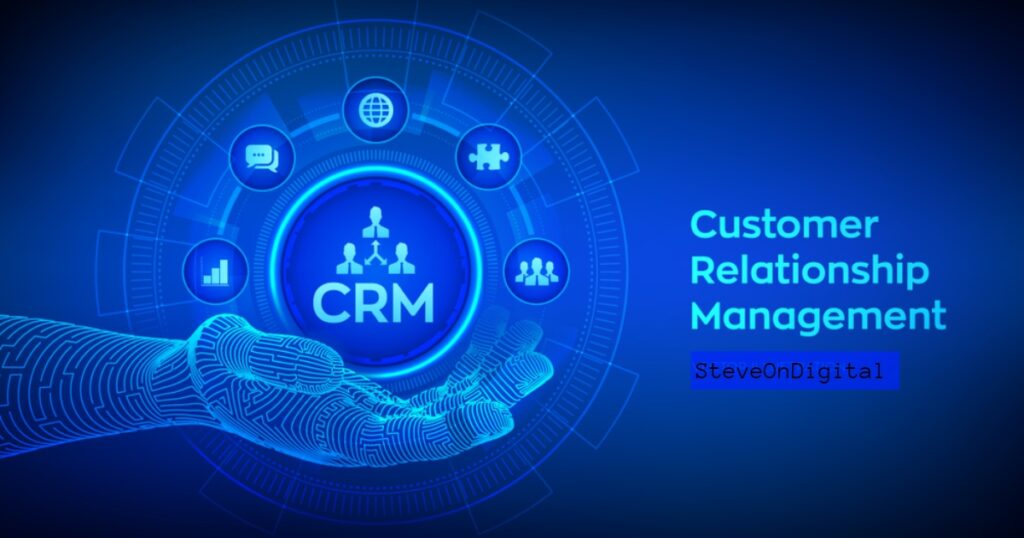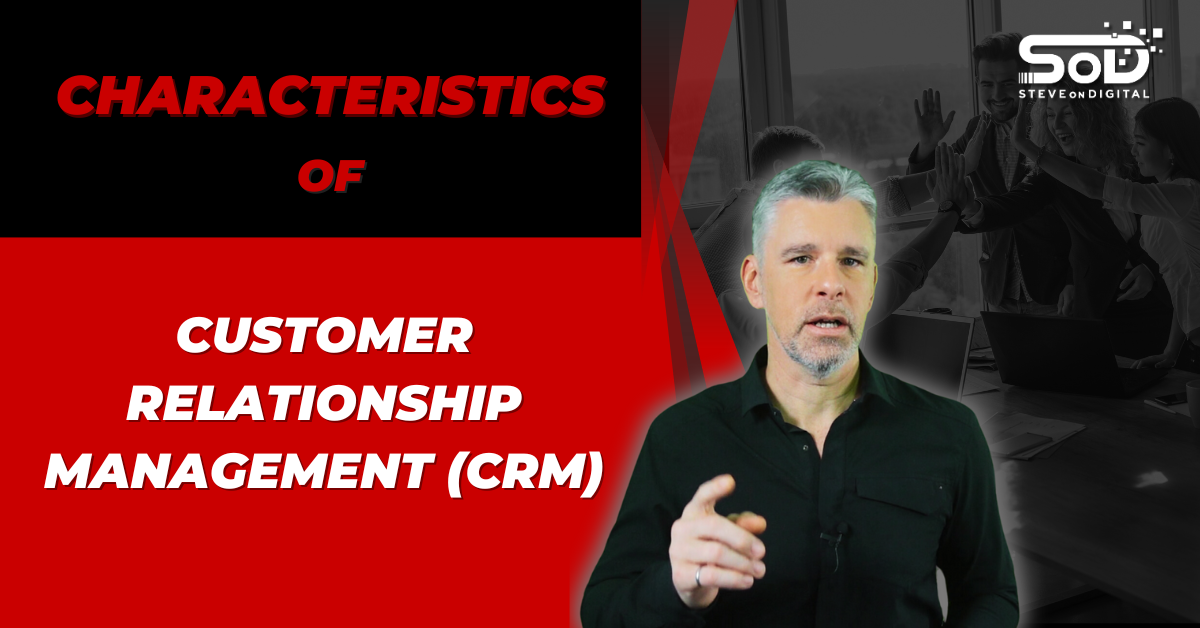Customer Relationship Management (CRM) focuses on understanding and managing interactions with customers to improve business relationships.
Key characteristics include collecting customer data, analyzing interactions, and personalizing customer experiences.
CRM aims to enhance customer satisfaction and loyalty, streamline sales and marketing processes, and increase efficiency.
By leveraging technology, CRM systems provide valuable insights into customer behavior, enabling businesses to tailor their strategies to meet customer needs effectively.
Introduction To Customer Relationship Management (CRM)
As the founder of SteveOnDigital, my journey into the digital world has shown me the undeniable value of Customer Relationship Management (CRM).
At its core, CRM is about building and maintaining relationships with your customers.
It’s a strategy that has evolved from simple customer tracking systems to sophisticated platforms capable of managing and analyzing customer interactions across multiple channels.
The goal? To improve business relationships, retain customers, and drive sales growth.
Enhancing Customer Satisfaction with CRM
At the core of customer relationship management (CRM) is the pursuit of elevated customer satisfaction, a fundamental goal aimed at nurturing positive customer relationships and encouraging loyalty.
A successful CRM strategy is deeply rooted in the keen understanding and anticipation of individual customer needs and preferences.
By utilizing sophisticated CRM tools, businesses are empowered to offer personalized interactions, responsive service, and forward-thinking solutions, all of which are pivotal in boosting satisfaction levels.
Such a commitment to customer satisfaction not only secures repeat patronage but also fosters a positive reputation, laying the groundwork for a thriving and respected brand.
The Evolution Of CRM
The evolution of CRM is a testament to the rapid advancements in technology and the growing importance of customer-centric business strategies.
Initially, businesses used manual registers and spreadsheets to keep track of customer interactions, which was time-consuming and prone to errors.
The introduction of digital CRM systems revolutionized this process, offering a centralized platform to store customer data, track interactions, and automate sales processes.

Today, CRM technologies have embraced AI, cloud computing, and mobile applications, making CRM more accessible, powerful, and essential than ever before.
Core Characteristics Of CRM
CRM systems are the backbone of effective customer relationship management strategies.
Let’s explore their core characteristics in more detail:
Integration Capabilities
One of the most significant advantages of modern CRM systems is their ability to integrate with existing business tools and platforms.
This means that all customer interactions, whether they occur through email, social media, or the company website, can be captured and stored in one place.
For a business like SteveOnDigital, this integration capability ensures that we have a holistic view of our customer’s journey, enabling us to make informed decisions and provide personalized experiences.
Lead Management
Lead management is another critical feature of CRM systems.
It involves tracking potential customers (leads) from the first point of contact, through the sales funnel, to the final sale.
Effective lead management helps businesses understand where each lead is in the sales process, what actions are required to move them forward, and how likely they are to convert into paying customers.
This process is vital for optimizing sales strategies and improving conversion rates.
Strategic Insights from Customer Data via CRM
Customer data stands as a cornerstone within the CRM framework, offering invaluable insights into consumer behavior, preferences, and emerging trends.
The strategic collection, analysis, and deployment of this data are crucial for crafting informed business strategies, fine-tuning marketing efforts, and developing offerings that resonate with the target audience.
CRM software enhances this process through effective data segmentation, facilitating targeted communications and bespoke customer experiences that strengthen the bond between businesses and their clientele.
Workflow Automation
Workflow automation is about streamlining and automating repetitive tasks within the CRM system.
This can include sending follow-up emails, updating sales records, or assigning tasks to team members.
Automation not only saves time but also reduces the likelihood of human error, ensuring that no customer is overlooked and that each interaction is timely and relevant.
For small businesses and startups, this can be a game-changer, allowing them to compete with larger companies by maximizing efficiency and productivity.
CRM Fundamentals: Mastering Customer Engagement
Understanding the characteristics of Customer Relationship Management (CRM) is pivotal in navigating the complexities of modern business relationships.
CRM systems, at their core, are designed to foster positive customer relationships through strategic management of customer data, facilitating every phase of the customer lifecycle.
From lead management by sales reps to intricate sales forecasting, CRM software underpins the sales process, enhancing customer service processes and ensuring a seamless customer journey.

CRM platforms serve as a nexus for sales teams and marketing automation, centralizing sales and marketing departments to work off the same page, ensuring up-to-date information flows seamlessly through the sales funnel.
A successful CRM strategy leverages CRM tools for contact management, ensuring sales teams are aligned, and marketing teams can launch targeted marketing campaigns efficiently.
This ecosystem supports a dynamic sales cycle, amplifying customer engagement and fostering customer loyalty.
At the heart of CRM is the aim to enhance customer lifetime value through detailed analysis of sales data and customer information, enabling personalized customer experiences.
CRM solutions, equipped with mobile CRM capabilities, ensure sales reps and marketing departments can access critical data, engage in direct phone calls with potential customers, and automate repetitive tasks, all aimed at securing new customers and increasing customer retention.
The right CRM software not only streamlines workflow automation and project management but also enables sales CRM and sales analytics to work in tandem, optimizing the marketing efforts and sales pipeline for deeper customer relations and ultimately, a more profound understanding of the customer base.
Advanced Features And Trends In CRM
The CRM landscape is continually evolving, with new technologies enhancing how businesses interact with their customers.
Here are some of the most impactful trends:
Artificial Intelligence And Machine Learning
AI and machine learning are transforming CRM systems into predictive tools capable of offering insights into customer behavior, preferences, and potential sales opportunities.
These technologies can analyze vast amounts of data to identify patterns and trends, enabling businesses to anticipate customer needs and offer personalized solutions.
In my experience, leveraging AI in CRM has allowed us to not only react to our customer’s needs but to anticipate them, providing a level of service that truly sets us apart.
CRM Software: Catalyzing Success in CRM
CRM software acts as the technological pillar underpinning the execution of comprehensive CRM strategies, providing an arsenal of features tailored to enhance customer interactions and streamline business operations.
This includes everything from the automation of marketing initiatives to the efficient management of the sales pipeline and the delivery of superior customer service solutions.
CRM platforms afford businesses a holistic view of their customer base, while integration with advanced technologies like AI and analytics delivers predictive insights critical for tailoring customer engagement and shaping strategic business decisions.
Through the adept application of CRM technology, companies can navigate the entire customer lifecycle, from lead management through the sales cycle to post-purchase support, with unparalleled efficiency and insight.
Blockchain
Blockchain technology offers a new level of security and transparency in managing customer data.
By creating a decentralized and immutable ledger of transactions and interactions, businesses can provide customers with peace of mind regarding their data’s safety and integrity.
This technology is particularly relevant in today’s digital age, where data breaches and privacy concerns are at the forefront of customers’ minds.
IoT, AR, and VR
Internet of Things, Augmented Reality, and Virtual Reality technologies are opening up new avenues for customer engagement and interaction.
IoT devices can provide businesses with real-time data on how customers use their products, enabling them to offer timely support and personalized recommendations.
AR and VR, on the other hand, can create immersive shopping experiences, allowing customers to try products virtually before making a purchase.
These technologies are redefining the boundaries of customer engagement, offering exciting opportunities for businesses to connect with their customers in innovative ways.
Comprehensive Characteristics Of CRM
CRM systems offer a wide array of features that cater to the nuanced needs of businesses in managing customer relationships.
Here are some detailed characteristics:
Customer Segmentation
Customer segmentation is a powerful feature within CRM systems that allows businesses to categorize their customers into distinct groups based on various criteria such as demographics, purchasing behaviors, and interaction history.
This segmentation enables businesses to tailor their marketing efforts, sales strategies, and customer service approaches to meet the specific needs of each segment.
For instance, at SteveOnDigital, we use customer segmentation to deliver personalized content and offers that resonate with different audience segments, significantly improving engagement and conversion rates.
Data-Driven Decision Making
In today’s digital age, making informed decisions is crucial for business success.
CRM systems provide a wealth of data analytics and reporting tools that help businesses understand customer behaviors, sales trends, and marketing effectiveness.
This data-driven approach enables businesses to identify opportunities for growth, areas for improvement, and strategies that are yielding the best ROI.
Leveraging CRM data has been instrumental in shaping our strategies at SteveOnDigital, allowing us to adapt and thrive in a constantly changing digital landscape.
Customization
The ability to customize CRM systems according to specific business needs is a critical feature.
CRM platforms offer various levels of customization, from user interfaces and dashboards to workflows and reporting formats.
This flexibility ensures that businesses can tailor the CRM system to fit their operational processes, enhance user adoption, and maximize the system’s effectiveness.
Customization has been key for us at SteveOnDigital, enabling us to create a CRM environment that aligns with our unique business model and processes.
Collaboration Tools
CRM systems often come equipped with collaboration tools that facilitate communication and coordination among team members.
These tools can include shared calendars, task assignments, document sharing, and internal messaging systems.

By improving collaboration, CRM helps ensure that everyone in the organization is on the same page regarding customer interactions and responsibilities.
This has been particularly beneficial for our team at SteveOnDigital, enhancing our ability to deliver consistent and efficient customer service.
Strategic Implementation And Management
Successfully implementing a CRM system requires a strategic approach that encompasses several key aspects:
Change Management
Introducing a new CRM system often involves significant changes to existing processes and workflows.
Effective change management is essential to ensure a smooth transition, minimize resistance, and maximize adoption.
This involves clear communication, training, and support for all users.
At SteveOnDigital, we’ve found that involving team members in the CRM selection and implementation process helps build ownership and ease the transition.
CRM Training And Adoption
For a CRM system to be effective, users must be proficient in its functionalities and understand its value to their daily work.
Comprehensive training programs, user manuals, and ongoing support are crucial for ensuring high adoption rates.
We’ve prioritized CRM training at SteveOnDigital, offering regular sessions and resources to ensure our team can leverage the system to its full potential.
Future-Proofing Your CRM
The digital landscape is continually evolving, and CRM systems must adapt to keep pace with new technologies and changing business needs.
Choosing a CRM platform that offers scalability, regular updates, and integration capabilities with new technologies is essential for future-proofing your investment.
At SteveOnDigital, we regularly review our CRM strategy to ensure it aligns with our long-term goals and the latest digital trends.
CRM And Environmental Sustainability
CRM systems contribute to environmental sustainability by digitizing processes that were traditionally paper-based, reducing the need for physical storage, and optimizing business operations to be more efficient.
For example, digital invoicing and e-signatures minimize paper use, while data analytics can optimize marketing campaigns to reduce waste.
At SteveOnDigital, we’re committed to leveraging CRM not just for business efficiency but also as a tool for environmental stewardship.
The Psychology Behind CRM
Understanding the psychology behind customer behaviors and decisions is crucial for effective CRM.
This involves delving into the motivations, expectations, and preferences of customers, which can significantly influence how businesses approach customer engagement and loyalty strategies.
Emotional Engagement:
Customers are more likely to develop loyalty to brands that evoke positive emotions.
CRM systems help in mapping out customer journeys and identifying touchpoints where emotional engagement can be enhanced.
Personalization:
The psychology of personalization plays a significant role in customer satisfaction.
Customers appreciate when businesses recognize their unique needs and preferences.
CRM data allows for the segmentation and targeting that make personalized communication and offers possible.
Trust and Transparency:
Building trust with customers involves being transparent about how their data is used.
CRM systems can help businesses manage consent and preferences, ensuring that customer relationships are built on a foundation of trust.
Incorporating these psychological insights into CRM strategies has enabled SteveOnDigital to foster deeper connections with our audience, turning casual interactions into lasting relationships.
CRM In Non-Profit Organizations
CRM isn’t exclusive to for-profit businesses; non-profit organizations can also leverage CRM to enhance their operations and impact:
Donor Management:
CRM systems help non-profits track and manage donor information, making it easier to maintain relationships, communicate effectively, and encourage ongoing support.
Fundraising Campaigns:
By analyzing donor data, non-profits can tailor their fundraising campaigns to target the right individuals with the right message, increasing the likelihood of donations.
Volunteer Coordination:
CRM tools can streamline the management of volunteers, from scheduling to communication, ensuring that those offering their time and skills are effectively engaged.
| CRM Feature | Benefit for Non-Profits |
| Donor Management | Streamlines tracking and engagement of donors |
| Fundraising Campaigns | Enhances targeting and effectiveness of campaigns |
| Volunteer Coordination | Simplifies scheduling and communication |
| Event Management | Facilitates planning and execution of events |
| Reporting and Analytics | Provides insights for strategic decision-making |
At SteveOnDigital, we’ve seen firsthand how non-profits can benefit from CRM, achieving greater efficiency and impact in their mission-driven endeavors.
The Intersection Of CRM And Cybersecurity
As CRM systems store vast amounts of sensitive customer data, cybersecurity becomes a paramount concern.
Protecting this data is not just about technical safeguards; it’s about preserving customer trust and complying with legal requirements.
Data Protection Measures:
Implementing robust security measures, such as encryption and multi-factor authentication, is essential to protect customer data from unauthorized access.
Compliance with Regulations:
Businesses must ensure their CRM practices comply with data protection laws like GDPR and CCPA, which govern how customer information can be collected, stored, and used.
Regular Security Audits:
Conducting regular security audits and vulnerability assessments can help identify and mitigate potential risks to CRM data.
At SteveOnDigital, we prioritize the security of our CRM data, recognizing that the trust of our customers is the foundation of our success.
Artificial Intelligence Ethics In CRM
The integration of AI into CRM raises important ethical considerations.
While AI can enhance personalization and efficiency, it also poses risks related to privacy, bias, and transparency.
Privacy and Consent:
Ensuring that AI algorithms respect customer privacy and that data is used ethically is crucial.
Customers should have control over their data and understand how AI is being used to enhance their experiences.
Bias Mitigation:
AI systems are only as unbiased as the data they’re trained on.
Businesses must be vigilant in identifying and correcting biases in their CRM AI algorithms to ensure fair and equitable treatment of all customers.
Transparency:
Businesses should be transparent about their use of AI in CRM, providing customers with insights into how decisions are made and how data is analyzed.
Incorporating AI into our CRM strategy at SteveOnDigital has required careful consideration of these ethical dimensions, ensuring that our use of technology aligns with our values and the expectations of our customers.

CRM For Small Businesses And Startups
Small businesses and startups face unique challenges that CRM strategies can effectively address:
Cost-Effectiveness:
Many CRM solutions are designed with the budget constraints of small businesses in mind, offering scalable services that grow with the company.
Utilizing cloud-based CRM platforms, for instance, can reduce upfront costs and provide flexibility.
Customer Retention:
For small businesses, building and maintaining customer relationships is vital.
CRM systems help these businesses personalize interactions, track customer engagement, and predict future needs, thereby increasing customer loyalty and retention.
Agility and Responsiveness:
Startups and small businesses must be agile to survive and thrive.
CRM systems provide real-time data and insights, enabling these businesses to quickly adapt to market changes or customer feedback.
| Feature | Small Business/Startup | Large Enterprise |
| Integration Capabilities | High | High |
| Lead Management | High | Medium |
| Workflow Automation | Medium | High |
| Customer Segmentation | Medium | High |
| Data-Driven Decision Making | High | High |
| Customization | High | Medium |
| Collaboration Tools | Medium | High |
| AI and Machine Learning | Low | High |
| Blockchain | Low | Medium |
| IoT, AR, VR | Low | Medium |
At SteveOnDigital, we’ve leveraged CRM to not just survive but thrive, by ensuring that every customer interaction is meaningful and every opportunity for engagement is optimized.
Cultural Sensitivity In CRM
In an increasingly globalized market, cultural sensitivity is paramount in CRM practices:
Understanding Cultural Nuances:
Recognizing and respecting cultural differences in communication styles, purchasing behaviors, and service expectations can significantly enhance customer relationships.
Localized Marketing Strategies:
CRM systems can help businesses tailor their marketing efforts to reflect local cultures, traditions, and languages, thereby increasing relevance and effectiveness.
Building Global Relationships:
By fostering an inclusive and culturally aware approach, businesses can expand their reach and build strong relationships with diverse customer bases.
Incorporating cultural sensitivity into our CRM practices at SteveOnDigital has enabled us to connect with a broader audience and build trust across diverse markets.
CRM And The Future Of Work
The future of work is being shaped by digital transformation, and CRM is at the forefront of this evolution:
Remote Work:
CRM systems facilitate remote work by providing access to customer data and collaboration tools from anywhere, at any time.
This flexibility is essential for modern businesses looking to attract and retain top talent.
Digital Collaboration:
CRM platforms offer various tools that enhance teamwork, from shared calendars and task management to document sharing and communication channels.
These tools support a more connected and productive remote workforce.
Data-Driven Insights:
As businesses increasingly rely on data to make informed decisions, CRM systems become crucial for gathering and analyzing customer information.
This data-centric approach is shaping the future of strategic planning and customer engagement.
At SteveOnDigital, embracing the digital transformation facilitated by CRM has not only improved our operational efficiency but also enabled us to stay ahead of the curve in a rapidly changing business landscape.
Blockchain For Transparent Customer Relationships
Blockchain technology presents an exciting opportunity for enhancing CRM with unparalleled security and transparency:
Enhanced Trust:
By securely recording transactions on a decentralized ledger, blockchain can provide customers with assurance regarding the integrity and confidentiality of their data.
Smart Contracts:
These self-executing contracts with the terms directly written into code can automate and streamline processes such as sales agreements, rewards, and loyalty programs within CRM systems.
Data Security:
The immutable nature of blockchain ensures that once customer data is recorded, it cannot be altered or deleted, offering a new level of data protection.
Exploring the integration of blockchain into our CRM practices at SteveOnDigital is part of our commitment to leveraging cutting-edge technology to enhance customer trust and security.
Integrating CRM With Emerging Technologies
The integration of CRM with emerging technologies like AI, IoT, and blockchain is not just a trend; it’s a strategic imperative for businesses looking to offer innovative and personalized customer experiences:
Predictive Analytics:
AI and machine learning can analyze CRM data to predict customer behaviors and preferences, enabling businesses to proactively meet customer needs.
Enhanced Customer Interactions:
IoT devices can provide real-time data on product usage, offering opportunities for timely customer support and personalized marketing.

Security and Transparency:
As discussed, blockchain technology can revolutionize CRM by enhancing data security and building trust through transparency.
| Technology | Impact on CRM |
| Artificial Intelligence (AI) | Enhances personalization and predictive analytics |
| Blockchain | Increases data security and trust |
| Internet of Things (IoT) | Provides real-time customer usage data |
| Augmented Reality (AR) | Offers innovative customer engagement tools |
| Virtual Reality (VR) | Creates immersive product/service experiences |
| Quantum Computing | Promises breakthroughs in data processing and analysis |
At SteveOnDigital, we are constantly exploring how these technologies can be integrated into our CRM strategy to provide superior customer experiences and maintain a competitive edge.
The Bottom Line
Reflecting on the continuous evolution of CRM, it’s clear that its role in business strategy is more critical than ever.
From enhancing customer relationships and embracing cultural sensitivity to leveraging emerging technologies and adapting to the future of work, CRM is a powerful tool for businesses looking to thrive in the digital age.
At SteveOnDigital, our journey with CRM has been transformative, enabling us to connect with our customers on a deeper level, streamline our operations, and stay ahead in a rapidly evolving digital landscape.
As we look to the future, the potential of CRM is boundless, promising even more innovative ways to engage with customers and drive business success.





